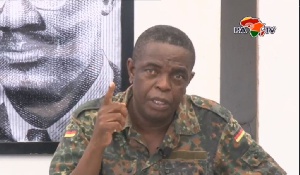- Home - News
- TWI News | TV
- Polls
- Year In Review
- News Archive
- Crime & Punishment
- Politics
- Regional
- Editorial
- Health
- Ghanaians Abroad
- Tabloid
- Africa
- Religion
- Election 2020
- Coronavirus
- News Videos | TV
- Photo Archives
- News Headlines
- Press Release
Opinions of Tuesday, 9 September 2003
Columnist: Mahama, John
It Is Not The End Of The World
“Why does the sun keep on shining? Why do the waves rush to shore? Don’t they know it’s the end of the world? It ended when I lost your love." These are the words of an old love song. The expectation of a love struck lover who hoped to wake up to the end of the world because they lost out on a puny love affair. There are many who today feel so important that they feel the world will end without them.
Idi Amin once the monarch of all he surveyed in Uganda recently died a solitary and unsung death in Saudi Arabia. The sun rose the next morning bright and shiny over Uganda, completely oblivious of the death of this comparatively insignificant mortal.
A philosophy I have imbibed that has served me well in life is that no person is indispensable to any society or process. The world will go on with or without us. Accept responsibility with humility and give your best to whatever you do, knowing that like an actor you are just playing your part and that however long the applause lasts, you will finally leave the stage and other actors take your place.
In London the wheels of the Hutton Inquiry grinds slowly but very finely with characteristic British efficiency. The high and mighty have all been humbled under the sharp scrutiny of this judicial inquiry. The Hutton Inquiry is probing the circumstances surrounding the death of Dr. David Kelly a weapons expert at the British Ministry of Defence who is believed to have committed suicide following the stress to which he was subjected over a BBC story accusing Government of “sexing up” an intelligence dossier making the case for war with Iraq.
The Hutton Inquiry has already claimed one casualty. The famous Alastair Campbell, a close aide of Prime Minister Tony Blair and Downing Street Communications Chief resigned recently. While Campbell has been at pains to explain that his resignation has nothing to do with the Hutton Inquiry, it is obvious that the train of events triggered by the death of David Kelly is what led to the eventual departure of Campbell from the Blair Government. Campbell is much loved and much hated by much of the British public. Sometimes described as the “King of Spin,” he is perceived to have instituted a culture of spin at Downing Street whose overriding objective has been to make Premier Blair and his government look good notwithstanding the consequences. A media person himself, ruthless media manipulation has been Campbell’s style.
New Downing Street Communications Chief David Hill is expected to take office this autumn. Prime Minister Blair is anxious to reverse the public perception of his government as one that survives on spin. He is expected to announce this week measures that will curb the power of Campbell’s successor and other senior political advisors on Downing Street. This is expected to be a major reform of New Labour’s communications strategy. These new measures, which are an outcome of recommendations of the Phillis Review, will seek to revise the relationship between the informal political advisors at Downing Street and the senior civil servants.
Indeed there probably are many parallels between the drama playing out in Britain and our own situation in Ghana. We have an administration that relies on a network of ‘senior journalists’ who justify every action of government. Ruthless media manipulations, skilful diversions, agenda setting, have become a hallmark of the present NPP Government’s current marriage with the media. A plethora of spin-doctors at the Castle, Ministry of information and cloned versions of these serving as special assistants in the ministries ensure the maintenance of a culture of spin in government. Indeed there is a lot of frustration in the civil service about the role this armada of special assistants play in the governance structure. They have totally eclipsed the Chief Directors and other administrative staff. They regularly usurp the role of Deputy Ministers by making major policy announcements and representing their Ministers at various official functions. In many cases they take decisions over and above deputy ministers and the senior administrative class.
Leader of the Conservative Party, Iain Duncan Smith greeted Campbell’s resignation with much cynicism. In an article in the Independent he declared that Campbell’s departure would not mean an end to the culture of spin at Downing Street. In quite strong words he said “the Prime Minister cannot distance himself from the failure of his government, or the abuse of its power.” He declared that “New Labour is not just a cast of miserable characters, it’s a culture – a culture of deceit.”
In Ghana it will take a much longer time to see through the spin of the Kufour administration. With a much higher illiterate population that hangs onto every word picked up from the media, selective presentation of information, half truths, and demonization of the previous administration has won the NPP short term political advantage, but as in all cases reality eventually catches up with spin and rebounds with a vengeance. It may take long for the scales to fall of the eyes of the people but surely that day will come when despite all the media control and manipulation, the people will wake up to the harsh realities of the truth.
Recent misunderstandings over GJA elections and disagreements over awards are a much deeper symptom of a political malaise that afflicts our media. The shackling of the media to the apron strings of a particular political tradition will continue to create dissonance and occasional upheaval until we end up with a media whose loyalty will not be to any political establishment but to the true interest of the Ghanaian people.
In requiring greater transparency and clarity in the activity of the GJA however, we must be careful not to do anything that will lead to a fracturing of this fine institution. A weakened GJA is in nobody’s interest and certainly not in the interest of journalists themselves. In the same way the creation of a rival students association to the NUGS is not in the interest of students and the nation at large. Conflict resolution mechanisms must quickly kick in to resolve the differences arising from the recent elections and awards ceremony.
Back to the UK, there are many departures however in the way the Hutton Inquiry is proceeding in ferreting out evidence surrounding Dr. Kelly’s death, compared with the last two commissions of inquiry held in Ghana – the Wuaku and Okudzeto Commissions. In just the 13 short days of its sitting, the wealth of information unveiled by Lord Hutton’s probe has cleared much of the murkiness surrounding the death of the weapons expert and vividly outlined the role played by each person in the events leading up to his alleged suicide. Even before the end of the sitting of the Hutton Inquiry, the resignation of Alastair Campbell and the reform of Downing Street’s communications strategy are clear attempts to take corrective measures and come to terms with the reality of the public perception of the Blair administration. The recommendations of the Hutton Inquiry are expected to be crisp and straight to the point no matter whose ox is gored. The inquiry is expected to reveal clearly what happened in the Kelly affair and strengthen the democratic credentials and institutions of Britain to prevent a future recurrence.
The same cannot be said of the work of Wuaku and Okudzeto. These two commissions have indeed left Ghanaians more confused now than at the beginning of their work. At the end of their sitting we have been unable to come to any firm conclusion about exactly what happened in the matter of the gruesome murders of the Ya Naa and his followers or the unfortunate loss of life in the stadium disaster. Subsequent judicial acquittal of persons fingered by the two commissions as being responsible for the unfortunate deaths leave us in a quandary as to the efficiency with which these commissions conducted their work or question the competence of the prosecution in both cases. Were the prosecutions sloppy? There are certainly more questions than answers in these two episodes.
In Britain the Blair administration is squirming under the gaze of Lord Hutton. Prime Minister Tony Blair himself appeared very nervous when he testified at the Inquiry. There could be more casualties before this whole drama is over. The names of Foreign Secretary Straw, Defence Secretary Hoon all popped up in the inquiry and have testified before the probe. The Blair administration had become overconfident in its ability to manipulate public opinion using spin. The long-term effects of the suicide of a stressed out public servant could have more far reaching consequences on the Blair administration than is presently anticipated. The Blair administration managed a great PR game in building its image in the eyes of the British public and electorate. In the case of the Iraqi dossiers however, it probably finally crossed the line of reasonableness in making its case for war with Iraq and the consequences so far have not been pleasant.
The continuing guerrilla war and unfortunate loss of British and American lives in Iraq conjures spectres of the Vietnam bog, where US forces got locked in a never-ending bloody battle of their lives. As it turns out Iraqi Information Minister ‘Comical Sahaf’s’ prediction that the coalition troop would meet their deaths in the deserts of Iraq was not to be taken literally. He probably knew Iraq would crumble in the face of the invasion by superior forces, but he could probably already have foreseen guerrilla attacks such as these, which have always proved to be the Achilles heel of bigger nations with superior forces.
Whether this eventually marks the undoing of the Blair Government, Great Britain and Ghana will surely survive the present political high and mighty. The sun will surely rise bright and sunny the next morning over both nations. The world will continue to rotate around the sun as it has done for millions of years. It will not be the end of the world.

Views expressed by the author(s) do not necessarily reflect those of GhanaHomePage.










